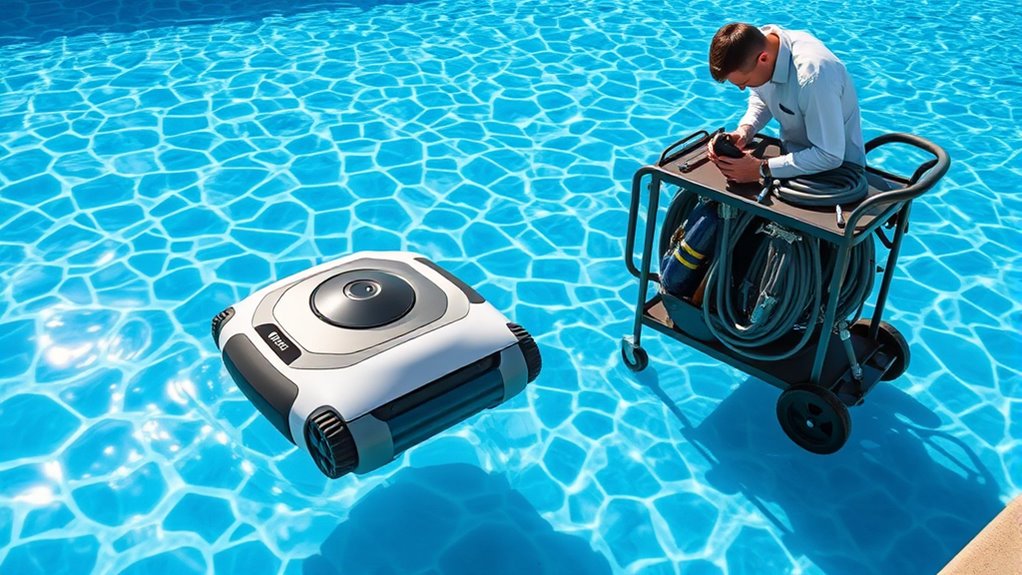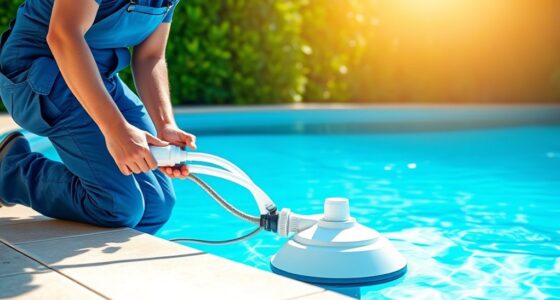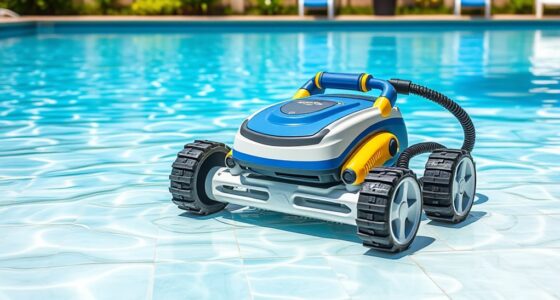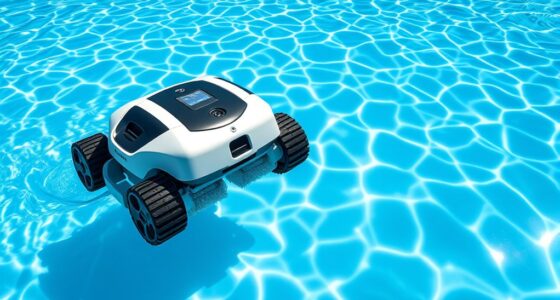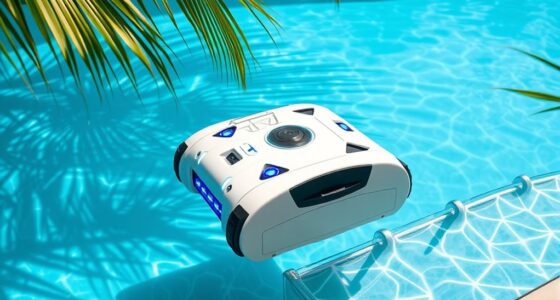Choosing between a robotic pool cleaner and hiring a pool service depends on your budget, pool size, and maintenance needs. Robotic cleaners offer hands-off, cost-effective cleaning and can be scheduled easily, but they require initial investment and some maintenance. Professional services provide all-encompassing care, including chemical balancing and repairs, which is ideal for larger or more complex pools. To find out which option fits your lifestyle best, explore the factors that matter most to you.
Key Takeaways
- Robotic cleaners offer automated, consistent cleaning with lower long-term costs, while pool services provide comprehensive maintenance and chemical management.
- Robots are easy to operate and schedule, reducing manual effort, whereas professional services handle repairs, chemical balancing, and inspections.
- Initial investment in robotic cleaners is higher but can save money over time by decreasing service visits and chemical expenses.
- Pool services include tasks beyond cleaning, such as equipment repair, chemical adjustments, and detailed inspections.
- Robotic cleaners promote environmental efficiency with energy-saving features, while traditional services may consume more water and energy.
Cost Comparison Between Robotic Cleaners and Professional Services
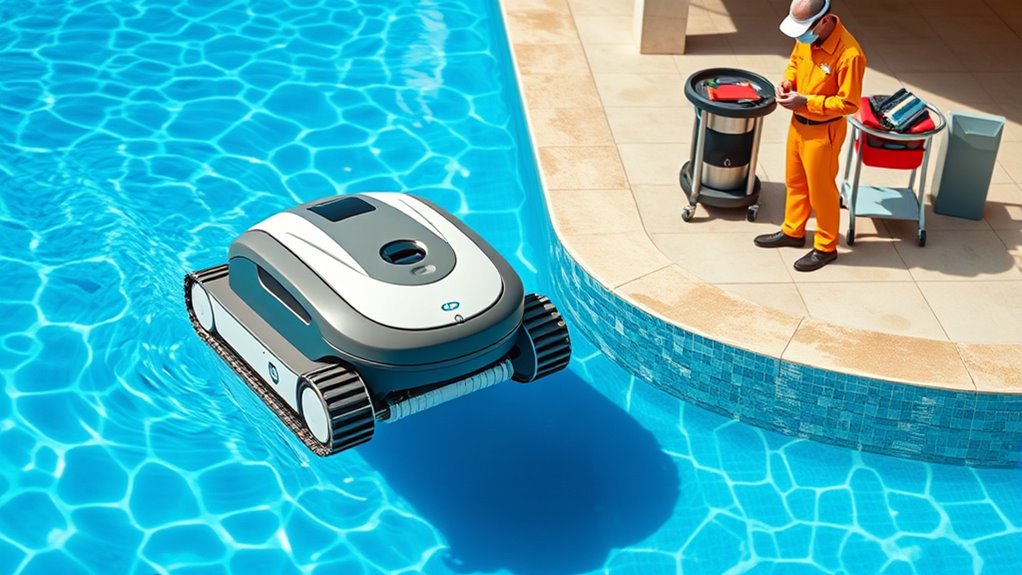
When comparing costs, robotic pool cleaners generally have a higher upfront price but lower ongoing expenses than professional pool services. If you’re working within budget constraints, this initial investment might seem steep, but it can pay off over time. Robotic cleaners require a one-time purchase, avoiding recurring labor fees, especially during peak seasons when demand for professional services spikes. Seasonal demand often leads to higher prices for pool maintenance, making a robotic cleaner more economical in the long run. Plus, since you can operate it yourself, you avoid scheduling delays and extra costs associated with hiring professionals. While the upfront cost can be intimidating, the lower maintenance and operational costs make robotic cleaners a smart choice for budget-conscious pool owners. Additionally, automatic operation ensures consistent cleaning without requiring manual effort, further reducing ongoing costs.
Effectiveness in Cleaning and Maintenance
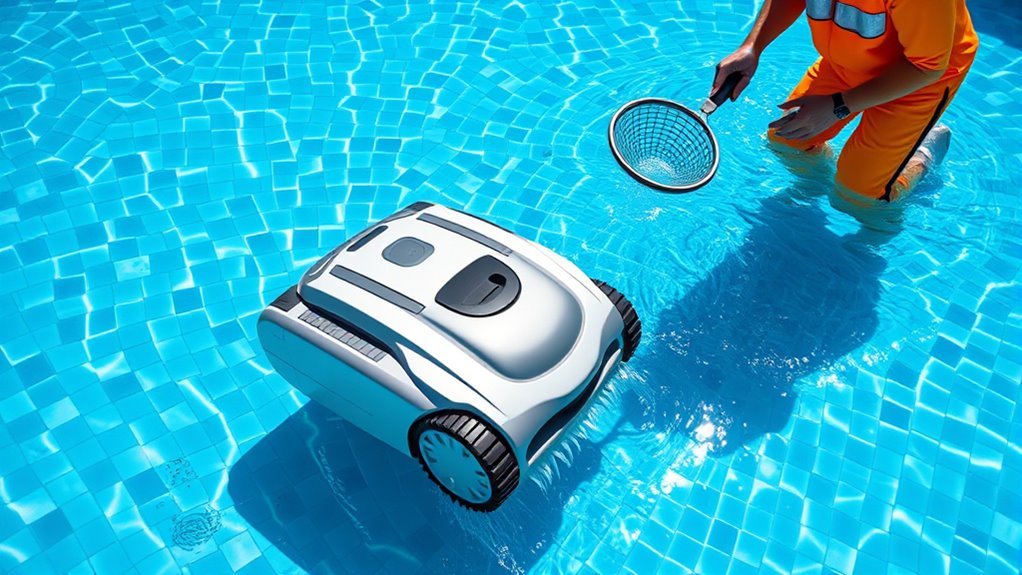
Robotic pool cleaners have substantially improved their cleaning capabilities, making them a reliable option for maintaining a spotless pool. They effectively remove dirt, debris, and algae, enhancing your pool’s aesthetics. Many models now include advanced scrubbing brushes and powerful suction to reach corners and surfaces thoroughly. While they excel at cleaning the pool’s surfaces, they also support proper chemical balancing by keeping the water clear and free of contaminants. Additionally, some models incorporate HEPA filtration to improve overall water quality, although their primary design is for surface cleaning. However, they may not always handle complex chemical adjustments or deep filtration as well as a professional service. Proper pool maintenance involves both mechanical cleaning and chemical management, which is where professional services excel. In addition, integrating regular professional inspections can help identify potential issues before they become costly repairs. For optimal results, using a combination approach that includes both robotic cleaners and professional oversight can ensure your pool remains pristine and inviting. Moreover, selecting a robotic cleaner with advanced navigation technology can enhance cleaning efficiency and coverage. Overall, robotic cleaners deliver consistent cleaning, but for ideal chemical balancing and thorough maintenance, combining their efforts with regular professional checkups can ensure your pool remains pristine and inviting.
Ease of Use and Convenience
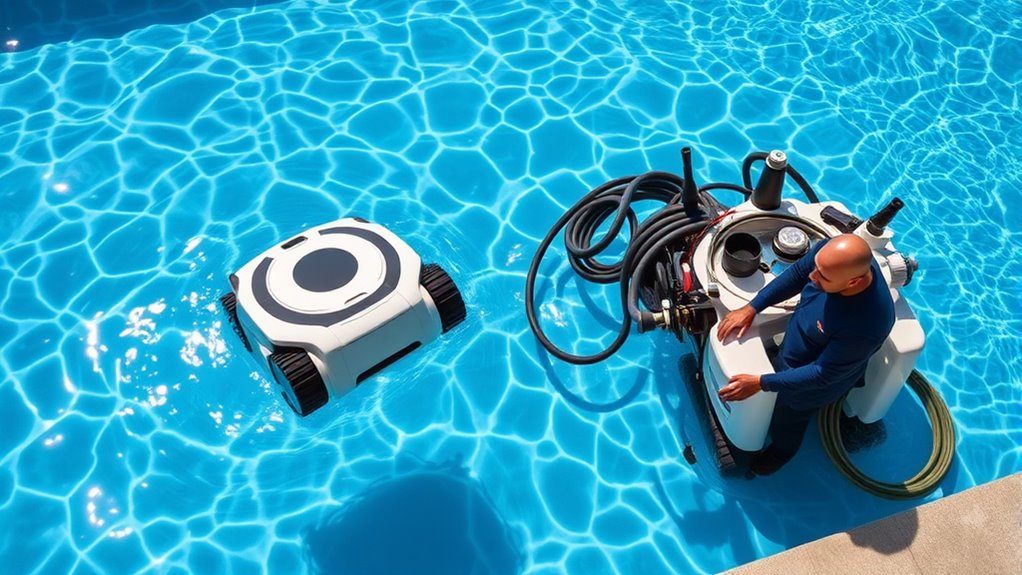
Robotic pool cleaners are designed to simplify the maintenance process, making pool cleaning more convenient for users. With a remote control, you can start, stop, or pause cleaning sessions from anywhere around the pool area, giving you control at your fingertips. Many models also feature customizable settings, allowing you to select specific cleaning modes, adjust cleaning cycles, or target certain areas of your pool. This flexibility means you don’t need to manually guide the cleaner or worry about complex setup processes. Instead, you can set it and forget it, saving you time and effort. Overall, robotic cleaners offer a user-friendly experience, combining intuitive controls with tailored cleaning options to fit your schedule and pool needs easily.
Frequency and Scheduling Flexibility
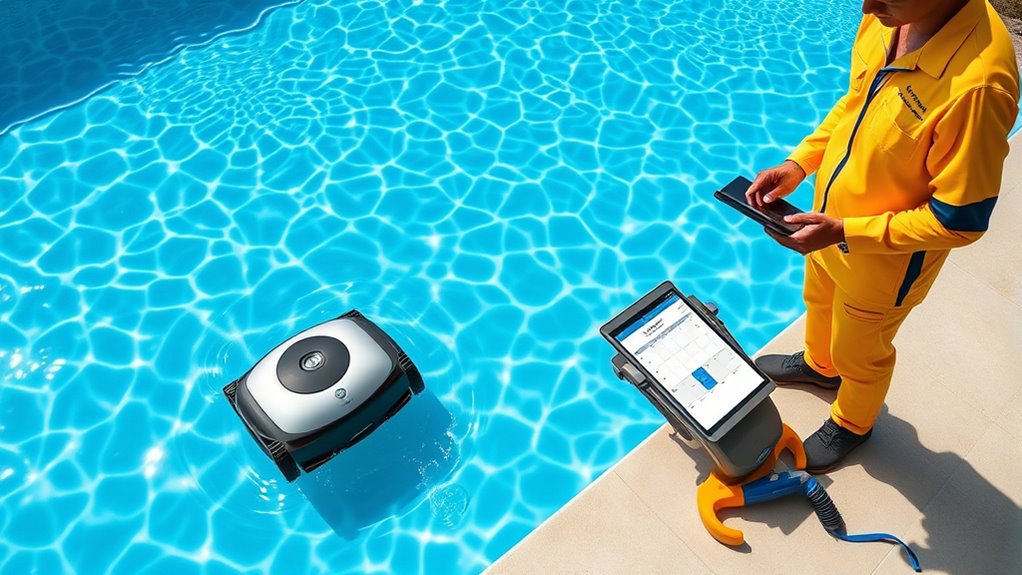
Unlike traditional pool services that rely on fixed schedules, robotic cleaners offer remarkable flexibility in setting cleaning frequency and timing. You can customize cleaning sessions based on your pool size, guaranteeing thorough coverage without over-cleaning. This flexibility allows you to adjust cleaning intervals to match seasonal changes or usage patterns, which helps maintain ideal water chemistry. For smaller pools, you might set daily cleanings, while larger pools may require less frequent sessions. Robotic cleaners enable you to schedule cleanings during off-peak hours, minimizing disruption. This control helps keep your water chemistry balanced, reducing the need for chemical adjustments. Additionally, sensor accuracy in robotic cleaners can influence how effectively they detect debris and dirt, ensuring thorough cleaning performance. The programmable features of many models further enhance their adaptability to your specific needs. Regularly checking and calibrating your robotic cleaner’s sensors can optimize their performance and longevity, ensuring consistent results. Overall, the adaptability of robotic cleaners ensures your pool stays clean and inviting with minimal effort and maximum convenience. Incorporating regular maintenance and inspections can further optimize their performance and longevity.
Scope of Services Covered

While traditional pool services often focus on basic cleaning and chemical balancing, robotic pool cleaners typically handle a broader range of tasks, offering more extensive coverage. They can vacuum debris, scrub surfaces, and monitor water quality with minimal human intervention. This expands the scope of services covered, providing consistent maintenance without scheduling conflicts. However, pool service providers often include additional services like equipment repairs and pool branding, which robots can’t perform. Customer service also plays a crucial role; professional services offer personalized support and troubleshooting, while robotic cleaners rely on user management and technical support. If you seek all-encompassing care and tailored assistance, traditional pool services deliver a wider scope, but if you prefer automation and convenience, robotic cleaners cover many essential tasks efficiently.
Initial Investment and Upkeep Expenses
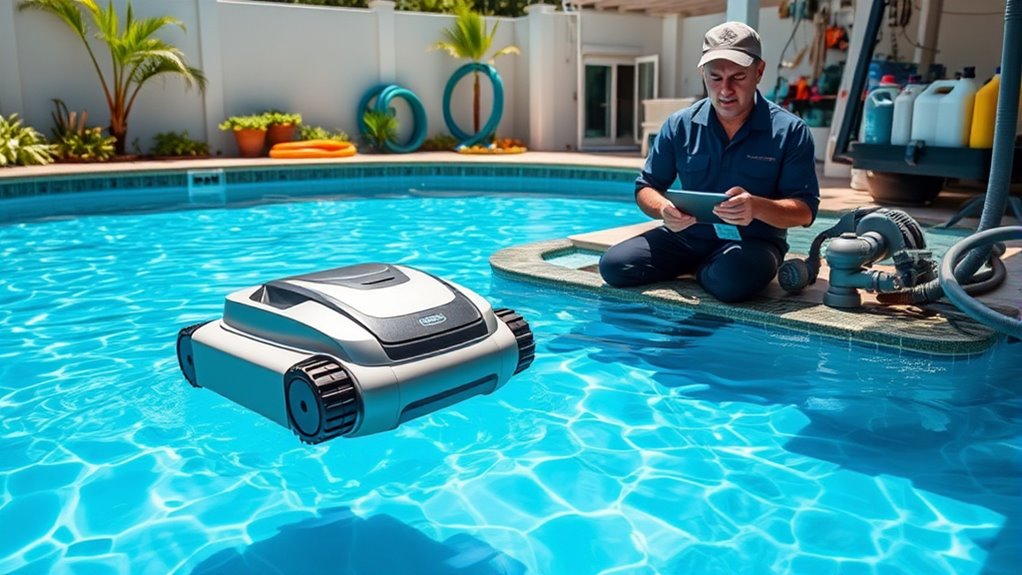
Investing in a robotic pool cleaner typically requires a higher upfront cost compared to hiring a traditional pool service. However, this initial expense can lead to significant cost savings over time. While you’ll pay more initially for the device, you’ll avoid ongoing labor fees charged by pool services, making it more cost-effective in the long run. Robotic cleaners generally have lower maintenance costs and require fewer chemicals, which helps reduce your overall expenses. Additionally, their durability contributes to long-term affordability, as you won’t need frequent replacements. Necessary cookies support essential site functions, ensuring your pool cleaning remains uninterrupted. Moreover, advancements in robotic technology have improved efficiency and reliability, making these devices a more viable option for many pool owners. As technology continues to evolve, the long-term savings potential increases, further justifying the initial investment. A well-maintained robotic cleaner can also prevent chemical overuse, helping to maintain safer water quality while reducing chemical costs. Properly calibrated devices can also optimize cleaning cycles, leading to improved water clarity and reduced chemical consumption. Although the upfront investment is higher, the savings from reduced service visits, labor, and chemical use can make a robotic cleaner a smarter financial choice over time.
Impact on Pool Equipment and Longevity
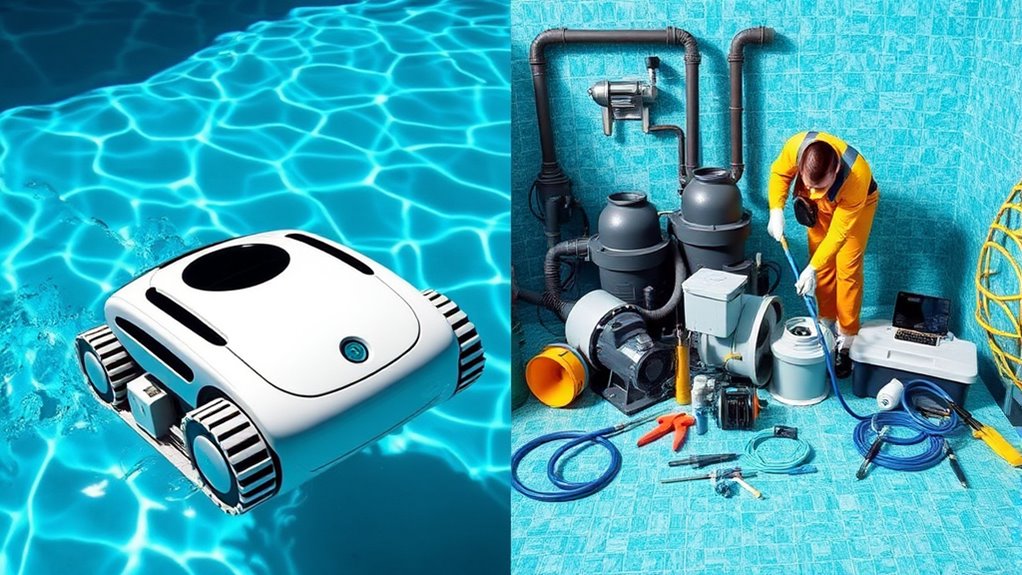
Using a robotic pool cleaner can cause mechanical wear on your pool’s equipment over time, potentially leading to more frequent repairs. You might also notice that both systems require regular maintenance to keep everything running smoothly. Considering these factors helps you understand how your choice impacts your pool’s lifespan and overall costs. Additionally, frequent use of robotic cleaners may accelerate pool component wear, necessitating more frequent inspections and replacements.
Mechanical Wear and Tear
Mechanical wear and tear can considerably affect the lifespan of your pool equipment, whether you’re relying on a robotic cleaner or traditional pool service. Over time, moving parts may become less efficient, leading to loud noises during operation. These noises often signal worn-out components that struggle with water circulation, reducing cleaning effectiveness and putting extra strain on the system. Continuous exposure to friction and debris can cause parts to degrade faster, shortening the lifespan of your equipment. If you notice unusual sounds or inconsistent water flow, it’s a sign that mechanical wear is impacting your system. Regular maintenance and equipment longevity strategies can help extend the life of your pool components. Addressing these issues early helps prevent costly repairs and maintains ideal water circulation, ensuring your pool stays clean and equipment lasts longer. Incorporating preventive maintenance can further reduce the risk of unexpected mechanical failures, especially since system efficiency depends on well-maintained components. Additionally, understanding how mechanical wear and tear impacts overall system performance is crucial for making informed maintenance decisions.
Maintenance and Repairs
Regular maintenance and prompt repairs are essential to keep your pool equipment functioning effectively and to extend its lifespan. Proper chemical balance prevents corrosion and buildup, reducing damage to pumps, filters, and other components. Maintaining water circulation ensures contaminants don’t settle, which can cause wear and clogging. If you notice issues like cloudy water or equipment noises, address them immediately to avoid costly repairs. Regularly inspecting and repairing your pool’s parts helps prevent small problems from escalating. Robotic cleaners can assist with routine cleaning but don’t replace the need for professional repairs or chemical adjustments. Staying on top of maintenance ensures your equipment remains efficient, saving you money in the long run and keeping your pool in excellent condition.
Skill Level Required for Operation and Maintenance
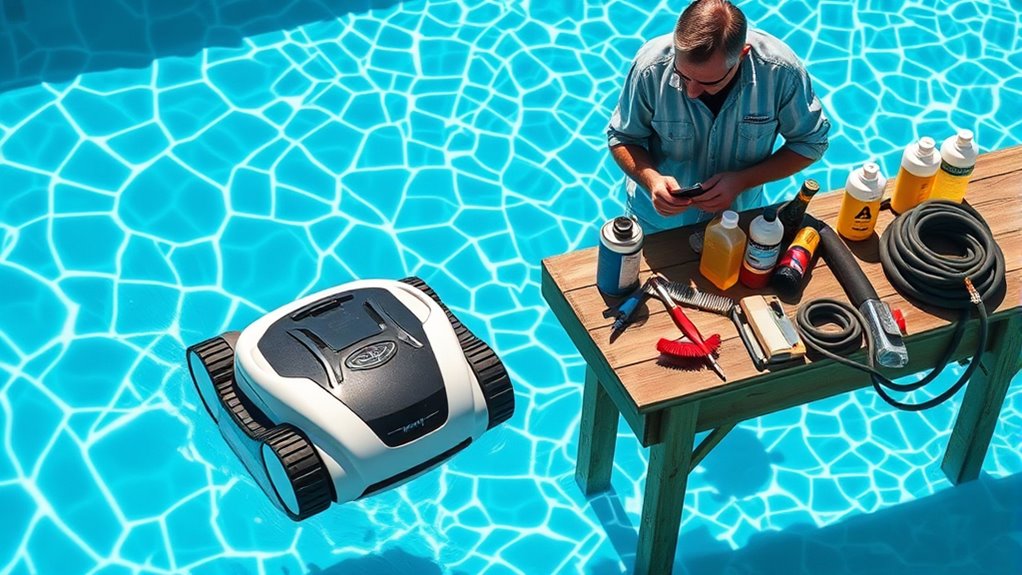
You don’t need advanced technical skills to operate a robotic pool cleaner, making it pretty straightforward for most homeowners. In contrast, pool service requires more effort, including regular maintenance and troubleshooting. Understanding the ease of use and maintenance demands can help you decide which option fits your skill level best.
Ease of Use
While robotic pool cleaners are designed to be user-friendly, they still require some basic understanding of setup and operation. You’ll need to consider your pool’s size and shape to choose the right model. Operating a robotic cleaner generally involves simple steps, such as installing the filter and placing it in the water. However, certain features may need adjustments based on your pool’s dimensions.
Here are four key points to keep in mind:
- Larger pools may require longer run times or multiple cleaning cycles.
- Irregular pool shapes might need manual guidance or specific navigation features.
- Setting up the cleaner involves connecting it to a power source and ensuring proper coverage.
- Understanding your pool’s unique features helps optimize cleaning performance.
Maintenance Complexity
Robotic pool cleaners are designed to simplify pool maintenance, but they still require a certain level of skill to operate and keep in good working order. You’ll need to monitor the chemical balance and water temperature regularly to ensure ideal cleaning performance. Additionally, some maintenance tasks involve troubleshooting connectivity issues or replacing brushes and filters. While less complex than manual cleaning, robotic cleaners demand basic understanding of pool chemistry and device care.
| Maintenance Aspect | Skill Level Needed |
|---|---|
| Adjusting chemical levels | Basic understanding of water chemistry |
| Cleaning filters and brushes | Moderate mechanical skills |
| Managing water temperature | Awareness of pool conditions |
Technical Knowledge Needed
Operating and maintaining a robotic pool cleaner requires a foundational level of technical knowledge, though it’s generally simpler than manual cleaning methods. You should understand your pool’s size to guarantee proper coverage and select the right model. Keeping an eye on water chemistry helps prevent mineral buildup and maintains ideal operation. Additionally, you’ll need to know how to:
- Clean and inspect filters regularly to maintain suction and cleaning efficiency
- Troubleshoot common issues like stuck brushes or navigation errors
- Charge and store the device properly to avoid damage
- Adjust settings based on pool size and water chemistry to maximize cleaning cycles
While not overly complex, a basic understanding of these elements helps ensure your robotic cleaner functions smoothly and lasts longer.
Environmental Considerations and Energy Efficiency
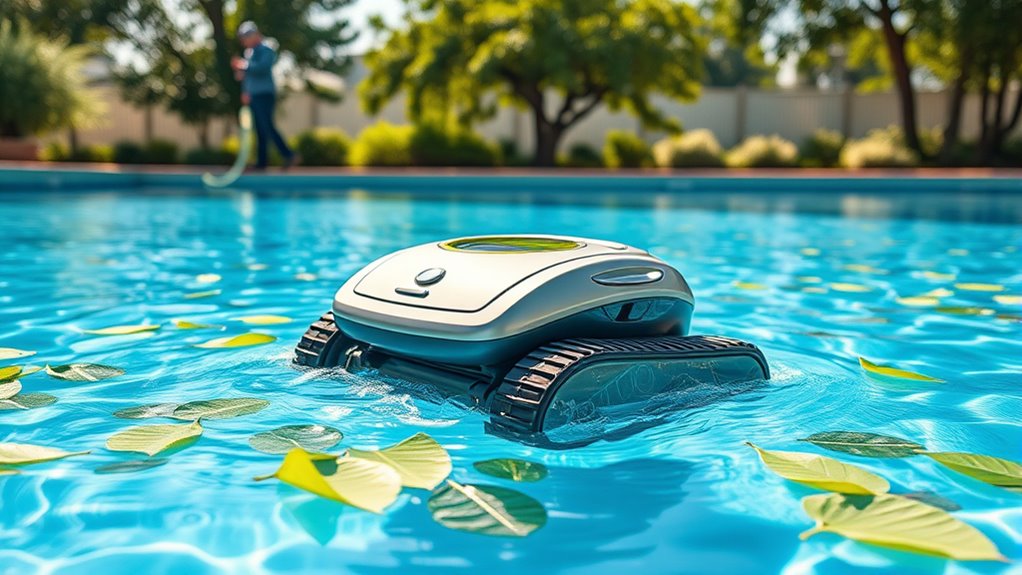
Considering environmental impact and energy efficiency is essential when choosing between a robotic pool cleaner and traditional pool services. Robotic cleaners often feature solar integration, allowing them to harness sunlight and reduce electricity use, making them more eco-friendly. They also promote water conservation by efficiently cleaning without overusing chemicals or requiring frequent draining. In contrast, traditional pool services typically rely on manual labor and constant chemical adjustments, which can lead to higher water and energy consumption. By opting for a robotic cleaner with solar capabilities, you minimize your carbon footprint and support sustainable practices. Overall, robotic pool cleaners offer a more environmentally conscious solution, helping you save energy and water while maintaining a clean, healthy pool.
Making the Right Choice for Your Pool and Lifestyle
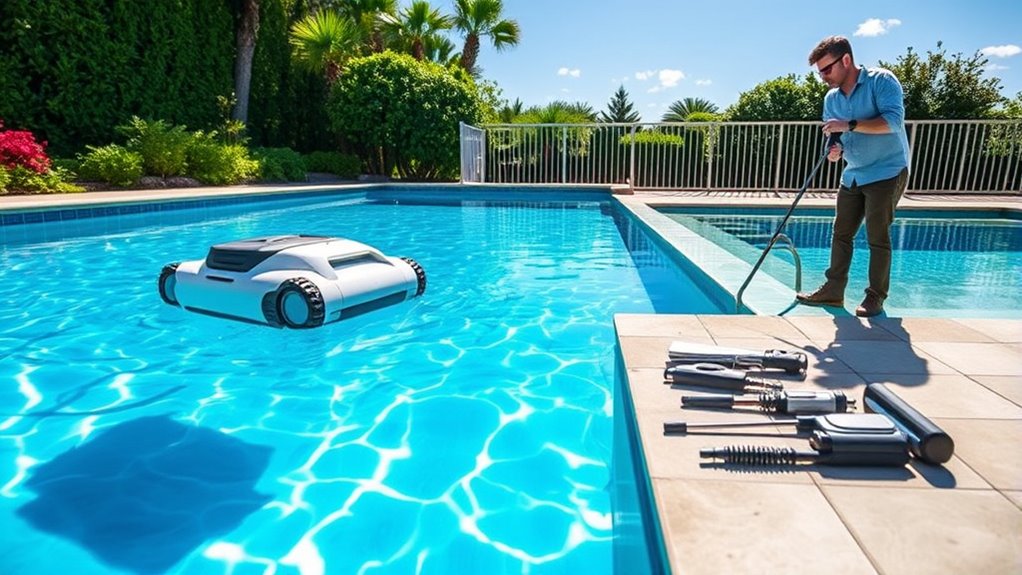
Choosing the right pool cleaning method depends on your lifestyle, budget, and how much time you’re willing to dedicate to maintenance. Consider seasonal factors like pool usage and climate, which affect cleaning frequency. To make an informed decision, evaluate:
- Your schedule—can you handle regular manual cleaning or prefer automation?
- Pool safety—ensure cleaning methods maintain water clarity and prevent accidents.
- Seasonal considerations—winterizing or summer upkeep may influence your choice.
- Budget constraints—initial costs and ongoing expenses play a key role.
A robotic pool cleaner offers convenience and consistent cleaning, especially during heavy usage seasons. Alternatively, hiring a pool service might suit those prioritizing pool safety and minimal effort, particularly if seasonal maintenance is a concern.
Frequently Asked Questions
How Long Does a Robotic Pool Cleaner Typically Last?
A robotic pool cleaner typically lasts around 3 to 8 years, depending on usage and maintenance. Its battery life usually diminishes over time, affecting cleaning efficiency. You might need to replace the battery or the entire unit eventually, which can incur replacement costs. Proper care, like regular cleaning and avoiding harsh chemicals, can extend its lifespan, ensuring you get the most value before replacements become necessary.
Can Robotic Cleaners Handle All Pool Shapes and Sizes?
You might wonder if robotic cleaners can handle all pool shapes and sizes. Generally, they offer good pool shape versatility, but their cleaning efficiency varies. For complex or irregular pools, some models might struggle to reach every corner or navigate tight spaces. To maximize performance, choose a robotic cleaner designed for your specific pool size and shape. Proper selection guarantees thorough cleaning, saving you time and effort in maintaining your pool.
What Maintenance Is Required to Keep a Robotic Cleaner Functioning?
Ever wondered what it takes to keep your robotic pool cleaner running smoothly? To guarantee peak performance, you should regularly clean the filter and check for debris, which helps with filter maintenance. Don’t forget about battery replacement—most models need a new one every few years. Isn’t it worth a little effort to have a spotless pool? Proper maintenance keeps your cleaner working efficiently and extends its lifespan.
Are Robotic Pool Cleaners Suitable for Saltwater Pools?
You might wonder if robotic pool cleaners are suitable for saltwater pools. Generally, they’re saltwater compatible, but you should verify for models with corrosion-resistant parts. Saltwater can have corrosive effects on certain components, so choosing a cleaner designed for saltwater pools helps ensure durability. Regular maintenance and rinsing after use can also minimize damage, keeping your robotic cleaner functioning well and extending its lifespan in a saltwater environment.
How Do Weather Conditions Affect the Performance of Robotic Pool Cleaners?
Weather impact can considerably affect your robotic pool cleaner’s performance, especially under outdoor conditions. Heavy rain, wind, and debris can clog filters and reduce cleaning efficiency. Extreme temperatures might strain the system or cause malfunctions. To keep your cleaner working smoothly, regularly remove debris, check for damage after storms, and store the device in a dry, sheltered place during harsh weather. Staying proactive ensures your pool stays clean regardless of outdoor conditions.
Conclusion
Choosing between a robotic pool cleaner and hiring a pool service depends on your budget, lifestyle, and maintenance needs. If you want to keep things running smoothly without breaking the bank, a robotic cleaner might be your best bet—it’s like having a trusted hand on deck. However, for thorough care, a professional service can cover all bases. Weigh your options carefully, and remember, it’s about finding the right fit for your pool and peace of mind.
